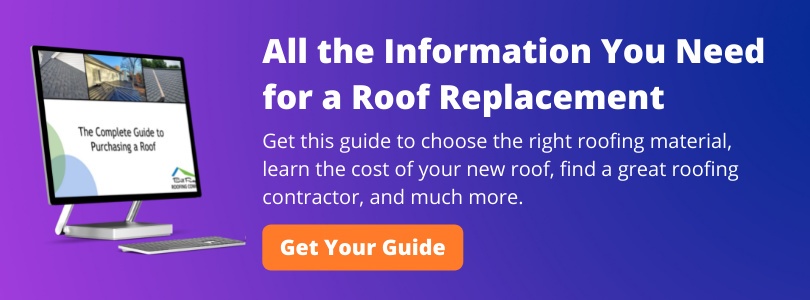Roof Replacement | Roofing materials
The 8 Best Roofing Materials for a Residential Roof Replacement
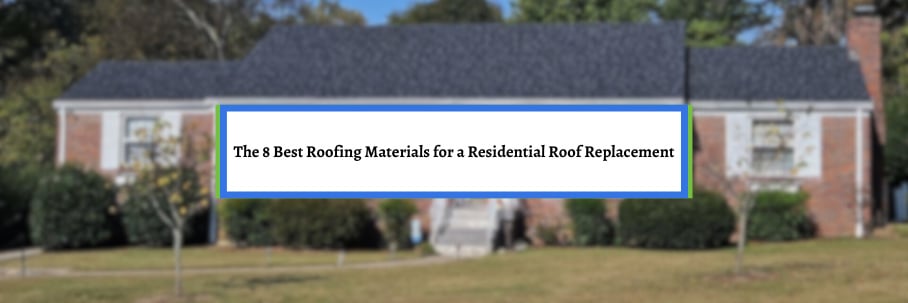
Time to replace the roof on your home? Are you trying to decide which roofing material to choose for your roof replacement?
Other than picking a roofing contractor, choosing a roofing material is the biggest decision you’ll make during the entire process. It affects everything from pricing to how long your roof lasts after it’s installed.
So, making the right roofing material decision is crucial. However, there’s a wide variety to choose from, which can be overwhelming without all the facts.
For over 30 years, Bill Ragan Roofing has provided homeowners with transparent and honest information to help them make the right roofing decisions. Now, I want you to have confidence when choosing a roofing material.
Let’s get to the cost, lifespan, warranty, and pros and cons of the 8 best roofing materials for residential roof replacements.
1. 3-tab asphalt shingles
3-tab asphalt shingles lay flat and get their name from the 3 tabs on each shingle strip. This asphalt shingle used to dominate the residential roofing industry until technology improved to create architectural asphalt shingles.

So, 3-tab shingles are the most inferior of the three types, and many manufacturers are starting to phase them out.
Cost: ≈$4.00 per square foot
Lifespan: ≈20 years at most
Material warranty: 25-year limited warranty from the manufacturer
3-tab asphalt shingle pros:
- Cheapest roofing material on the market
- Ease of repair and installation
3-tab asphalt shingle cons:
- Shortest lifespan
- Being phased out of the roofing industry
- Hard to find color matches for repairs and insurance
- Needs yearly maintenance
- Low curb appeal
- Prone to wind damage
2. Architectural asphalt shingles
Architectural (also called dimensional) shingles provide a random pattern to give your roof dimension or simulate the look of a wood-shake roof. This asphalt shingle is the most popular out of the three types.

However, it’s also the most common roofing material in the United States for residential roofing.
Cost: ≈$5.86 per square foot
Lifespan: 22-25 years
Material warranty: 30-year warranty (prorated after 10 years) from the manufacturer. Upgrade to a 50-year non-prorated enhanced warranty with a full roof system.
Architectural asphalt shingle pros:
- Affordability
- Ease of repair and installation
- Readily available materials and colors
Architectural asphalt shingle cons:
- Low curb appeal compared to other materials
- Needs yearly maintenance
- Prone to hail damage
3. Luxury asphalt shingles
Luxury (also called designer or premium) shingles are designed to look like a natural slate tile roof. They are larger, more durable, offer the highest curb appeal, and are the most expensive of three types of asphalt shingles.
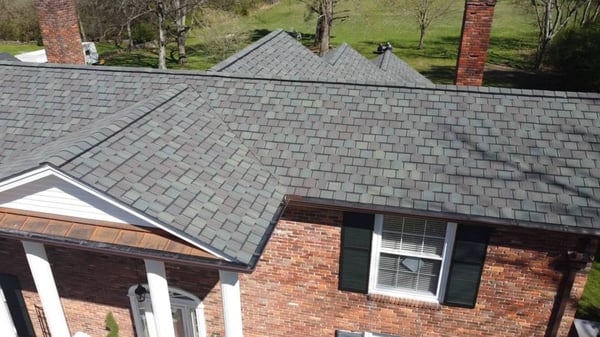
Cost: ≈$8.00 per square foot
Lifespan: ≈30 years or longer in perfect conditions
Material warranty: 30-year warranty (prorated after 10 years) from the manufacturer. Upgrade to a 50-year non-prorated enhanced warranty with a full roof system.
Luxury asphalt shingle pros:
- Durability
- Longevity
- High curb appeal
- Stands up well to storm damage
Luxury asphalt shingle cons:
- Expensive
- Longer installation compared to the other asphalt shingles
- Needs yearly maintenance
4. Exposed fastener metal roofing
An exposed fastener metal roof (also called screw down) is a series of panels fastened down to the decking through the metal. This not only leaves the fasteners exposed on top of the metal, but it also puts pressure on the panels when expanding and contracting.

Because of this, the screws must be replaced every 5-10 years or so to avoid leaks and wind lifting the panels up.
Cost: ≈$4.50-$6.50 per square foot
Lifespan: ≈20 years (can get up to 30 with maintenance)
Material warranty: Paint warranty, but length varies by manufacturer
Exposed fastener metal roofing pros:
- Affordability
- Color options
- Durable
- Don’t have to worry about oil canning
Exposed fastener metal roofing cons:
- Prone to leaks
- Needs consistent maintenance
- Lack of metal options
- Makes noise when it rains
- Hard to repair
5. Standing seam metal roofing
A standing seam metal roof system is a series of panels locked together at the seams or seamed mechanically. Under each rib (seam) is a clip that fastens the panels together and allows them to glide back and forth when the metal goes through thermal expansion.
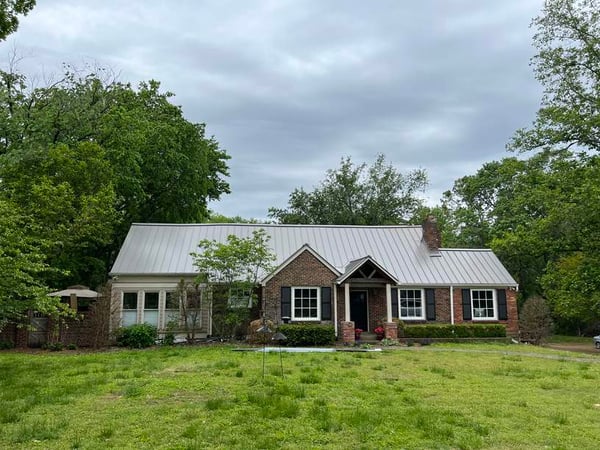
Because of its expansion and contraction capabilities, a standing seam metal roof is the recommended type of metal roof for residential purposes.
Cost: ≈$12.00-$15.00 per square foot
Lifespan: 30 years (up to 50 in the right conditions)
Material warranty: 30-year paint warranty on the Kynar 500 painted finish
Standing seam metal roofing pros:
- High curb appeal
- Versatility (used to accent asphalt shingle roofs)
- Color options
- Long-lasting
- Durable
- Virtually maintenance-free
Standing seam metal roofing cons:
- Expensive
- Potential for oil canning
- Makes noise when it rains
- Hard to repair
6. Synthetic shingle roofing
Synthetic (also called composite) shingles are made of a synthetic polymer or recycled materials and designed to look exactly like a slate or cedar shake roof. This roofing material is a newcomer to the roofing industry, but it’s becoming increasingly popular among homeowners.

Cost: ≈$14.00-$20.00 per square foot
Lifespan: ≈40-50 years
Material warranty: Depends on the manufacturer
Synthetic shingle roofing pros:
- Eco-friendly
- Very high curb appeal
- Class 4 impact rating
- No cracking or breaking like natural material counterparts
- Cheaper than the materials it mimics
Synthetic shingle roofing cons:
- Newer to the roofing industry
- Expensive
7. Cedar shake roofing
Cedar shake shingles are a premium roofing material made of natural wood cut into individual shingles. The shingles come from large cedar trees in the Northwest United States or Southwest Canada.
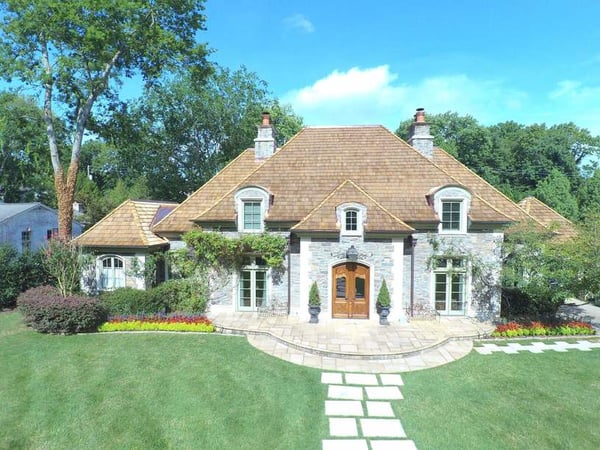
They are split into 3 grades (types) of cedar shake shingles: common (most inferior), selects (80/20 split), and 100% straight grain (highest quality).
Cost: ≈$25.00-$30.00 per square foot
Lifespan: ≈30 years (up to 50, depending on your area’s climate)
Material warranty: None (made from natural materials)
Cedar shake roofing pros:
- Very high curb appeal
- Durable
Cedar shake roofing cons:
- Expensive
- Needs yearly maintenance
- Loses the “fresh” color over time
- Cedar shakes rot, crack, and curl as they age
- No material warranty
- Materials may not be readily available
8. Slate roofing
Slate roofing is a premium roofing material made out of naturally mined slate. The slate is mined mainly in Italy and cut into square tiles.

Unlike other roofing materials that come in 3-foot-wide strips or metal panels, slate tiles are installed one at a time. Slate roofs are also incredibly heavy, so your home has to be built or retro-framed to carry the weight of a slate roof.
Cost: ≈$20.00-$30.00
Lifespan: 75 to 100 years
Material warranty: None (made from natural materials)
Slate roofing pros:
- Longest-lasting roofing material available
- Very high curb appeal
- Durable
Slate roofing cons:
- Expensive
- The weight factor
- Slate tiles are fragile
- Slow and skillful installation
- Harder to repair
- No material warranty
What do you need to consider when getting a roof replacement?
After reading this article, you will find the best roofing materials for residential roof replacement in the United States. With the pricing, lifespan, and warranty information, plus the pros and cons, you should have an idea of which one is right for you.
However, the roofing material is just one thing you should consider when getting a new roof. And with the investment it requires, it’s crucial to go into the process as prepared as possible.
That’s why I wrote another article breaking down the things every homeowner should consider before replacing their roof.
Check out 7 Things to Consider Before a Roof Replacement to start the process with the right mindset and information needed to get a roof that lasts.


